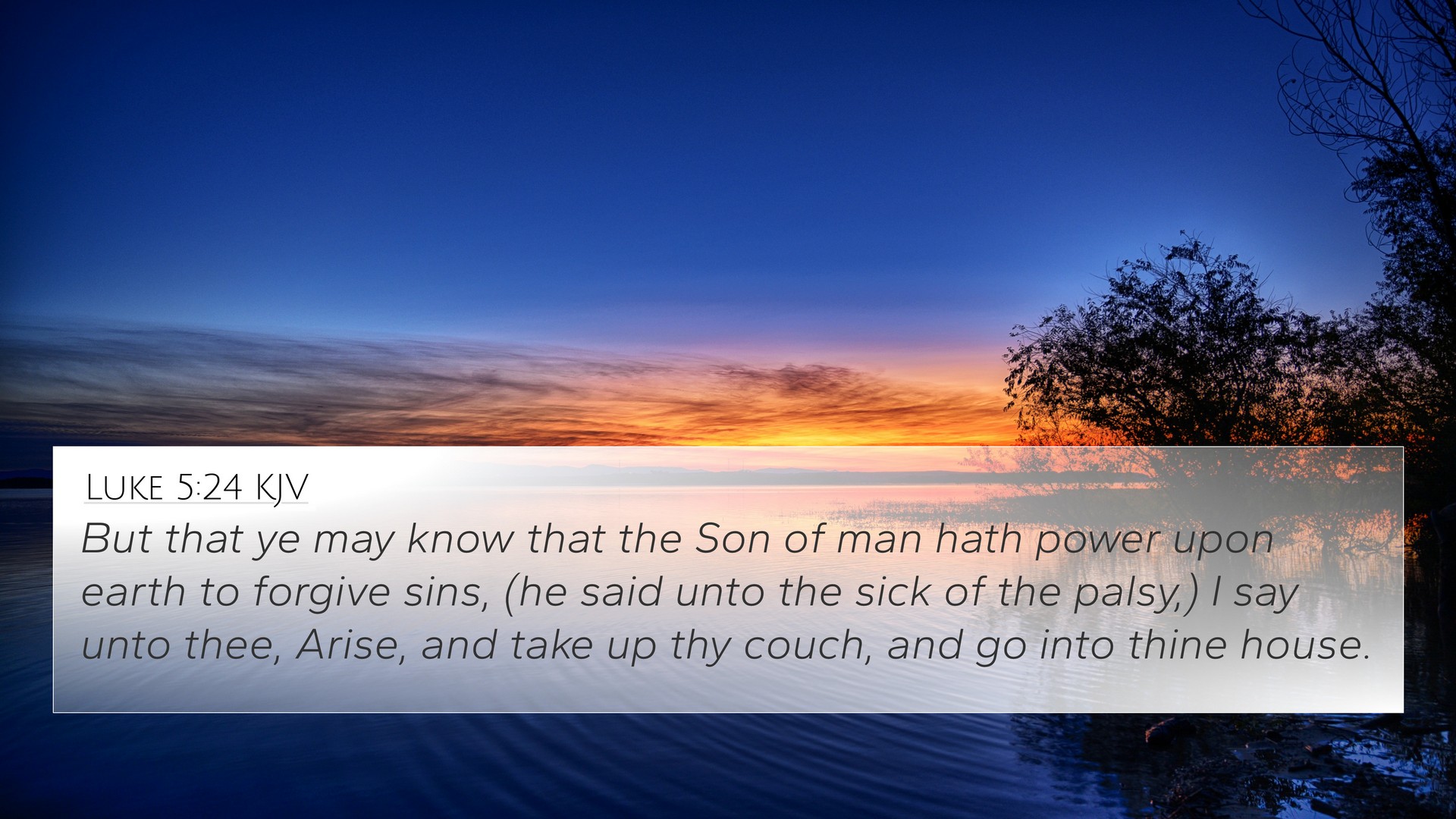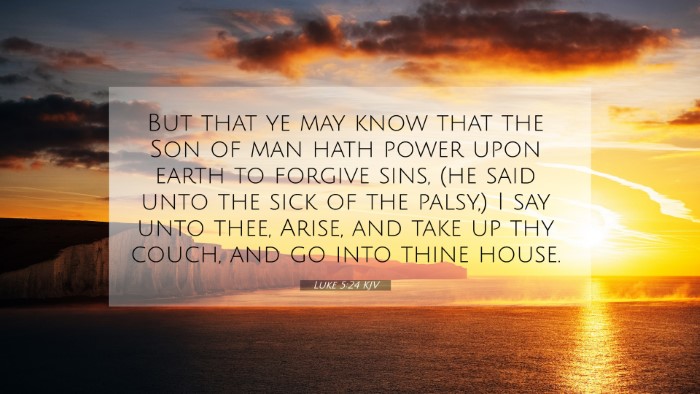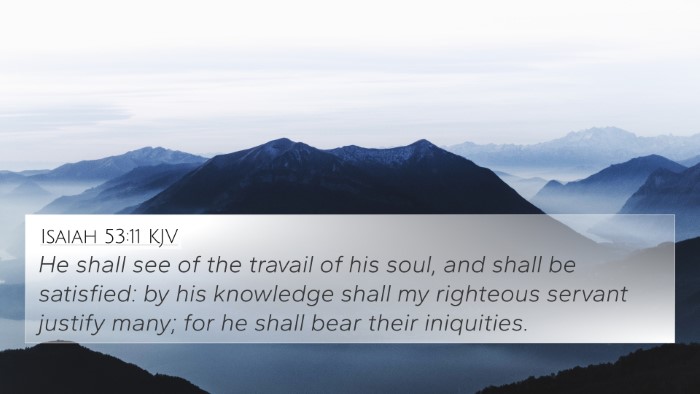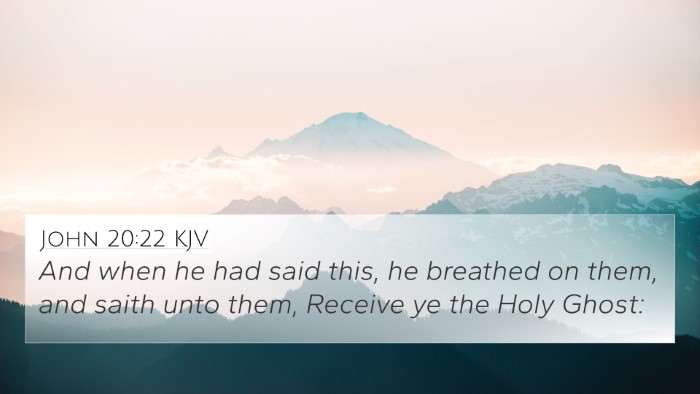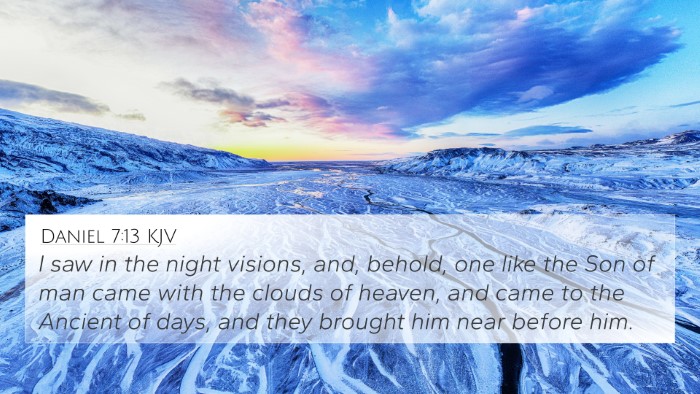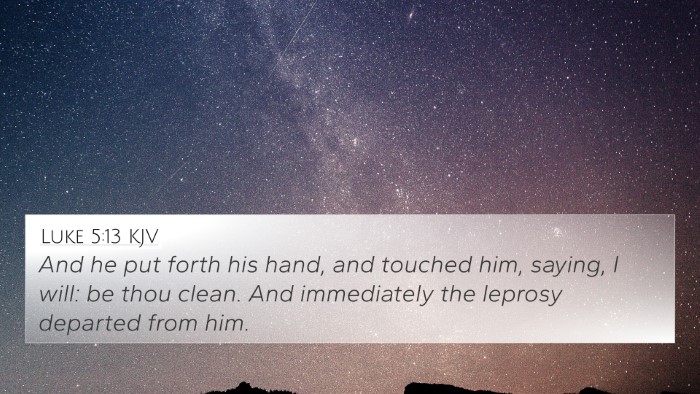Understanding Luke 5:24
Luke 5:24 (ESV): "But that you may know that the Son of Man has authority on earth to forgive sins—he said to the man who was paralyzed—'I say to you, rise, pick up your bed and go home.'
This verse is pivotal in conveying the dual nature of Jesus’ mission, emphasizing both His authority to forgive sins and His power to heal physical ailments. The interaction in this narrative reveals deep theological implications concerning the identity of Jesus, the nature of sin, and the dynamics of faith.
Summary of Insights from Public Domain Commentaries
Combining insights from Matthew Henry, Albert Barnes, and Adam Clarke provides a rich framework for understanding this verse. Each commentator highlights different aspects of the text that contribute to a fuller interpretation.
1. Authority of the Son of Man
Matthew Henry: Emphasizes that the title 'Son of Man' signifies Jesus’ humanity, yet He demonstrates divine authority. His ability to forgive sins directly addresses the spiritual need of humanity, showcasing that physical healing is secondary to spiritual restoration.
Albert Barnes: Notes that the authority to forgive sins was a divine prerogative, indicating Jesus’ divinity and His role in God’s plan for salvation. Barnes underlines the connection between faith and forgiveness, where the man's healing serves as a confirmation of Jesus' claim.
Adam Clarke: Suggests that this moment assures us that Jesus is both the physician of the body and the soul. Clarke connects this with the fulfillment of prophesy regarding the Messiah's authority, reinforcing the understanding of Jesus as the awaited Savior.
2. The Role of Faith
Each commentator agrees on the fundamental role of faith in this passage. The paralyzed man's friends displayed remarkable faith by bringing him to Jesus, illustrating the communal aspect of faith and the lengths to which believers will go to seek healing.
Bible Verse Cross-References
Luke 5:24 connects thematically and contextually with several other biblical passages:
- Mark 2:5-12: Similar account emphasizing faith and forgiveness.
- Matthew 9:2-8: A parallel story affirming Jesus' authority to forgive sins.
- John 10:30: "I and the Father are one," establishing Jesus’ divine sovereignty.
- Isaiah 53:5: Prophecy indicating healing through His suffering.
- James 5:15: Highlights the connection between faith and healing within community.
- Luke 7:47: "But he who is forgiven little loves little," illustrating the correlation between the recognition of sin and appreciation for forgiveness.
- Colossians 2:13-14: Explains the act of forgiveness through Christ’s sacrifice, linking to the authority He exercises in forgiving sin.
Thematic Bible Verse Connections
The themes present in Luke 5:24 can be explored further through connecting scriptures:
- Forgiveness: 1 John 1:9 reinforces the promise of forgiveness through confession.
- Healing: Matthew 8:17 connects Jesus' healing acts to prophetic fulfillment.
- Faith: Hebrews 11:1 defines faith's essence as certainty in the unseen, which is visible in the friends' actions.
- Spiritual Authority: Matthew 28:18, where all authority in heaven and earth belongs to Jesus, echoing His authority present in Luke 5:24.
Comparative Bible Verse Analysis
Through a comparative analysis, we see a pattern of Jesus’ miracles often accompanied by declarations of authority. The consistent message across the Gospels highlights Jesus' dual role in fulfilling both physical and spiritual needs, establishing His kingdom's principles during His earthly ministry.
How to Use Bible Cross-References
If you are studying Luke 5:24 deeply, consider using cross-referencing methods. Engaging with a Bible concordance or Bible cross-reference guide can be helpful. Identifying key terms and themes can lead to a richer understanding of scripture and relationships between passages.
Inter-Biblical Dialogue
This verse serves as a profound point of dialogue between the Old Testament prophecies concerning the Messiah and the New Testament realities of Christ’s ministry. The cross-references to both healing and forgiveness highlight how Christ fulfills these Old Testament themes.
Conclusion
In summary, Luke 5:24 is not merely a historical account of a miracle; it is a deep theological statement about Jesus’ identity, authority, and the interconnection between faith, healing, and forgiveness. By exploring related scriptures, we appreciate the complexity of Jesus’ work on earth and the importance of understanding the Bible as an interconnected narrative.
